2018-2019学年度第一学期八年级英语上册语法要点归纳
八年级上册英语语法归纳总结

八年级上册英语语法归纳总结在八年级上册的英语学习中,语法是学习的重点之一。
通过对语法知识的掌握,可以更好地理解和运用英语,提高语言表达能力。
下面将对八年级上册英语语法进行归纳总结,希望能够帮助同学们更好地掌握这些知识。
一、名词。
名词是指人、事物、地方、时间等的名称。
在英语中,名词的复数形式通常是在词尾加上-s或-es。
有些名词的复数形式需要变化其词尾,如,man变为men,child变为children等。
另外,还有一些名词是不可数名词,它们没有复数形式,表示不可数的概念,如,water, milk, rice等。
二、代词。
代词是用来代替名词的词语,分为人称代词、物主代词、反身代词等。
人称代词包括主格和宾格,如,I/me, he/him, she/her等。
物主代词表示所属关系,如,my, his, her等。
反身代词则表示动作的主语和宾语是同一个人或物,如,myself, himself, themselves等。
三、动词。
动词是表示动作、状态或行为的词语。
在英语中,动词的时态有现在时、过去时和将来时等。
另外,动词的进行时和完成时也是需要掌握的重点。
动词的不规则变化形式也需要特别注意,如,go/went/gone, eat/ate/eaten等。
四、形容词和副词。
形容词用来修饰名词,表示人或事物的特征或性质。
而副词则用来修饰动词、形容词或其他副词,表示程度、时间、地点等。
形容词和副词的比较级和最高级形式也是需要掌握的知识点。
五、介词和连词。
介词用来连接名词、代词或动词等,表示时间、地点、方向、原因等关系。
常用的介词包括in, on, at, to, from等。
连词用来连接词语、短语或句子,表示逻辑关系。
常用的连词包括and, but, or, so等。
六、句型和句子结构。
在英语中,句子的结构包括主谓结构、主谓宾结构、主系表结构等。
此外,还有一些特殊句型,如,祈使句、感叹句、条件句等。
掌握句型和句子结构对于提高英语写作能力和阅读理解能力非常重要。
2018-2019学年人教版八年级英语上册全册知识点总结

2018-2019学年人教版八年级英语上册全册知识点总结Unit 1 Where did you go on n?本单元的话题是谈论假期活动内容,同时复一般过去时。
本单元的语法包括复一般过去时和研究不定代词和不定副词的用法。
不定代词和不定副词的用法包括以下几点:左边的some、any、every、no与右边的body、one、thing构成不定代词,而some、any、every、no与右边的疑问副词where构成不定副词。
一般情况下以some开头的不定代词和不定副词用于肯定句,以any开头的不定代词和不定副词用于否定句或疑问句。
以no开头的不定代词和不定副词则表示否定含义(no one为两个单词)。
当不定代词或不定副词和形容词连用时,形容词放在后面。
例如:He has XXX do.(他有重要的事情要做,肯定句用something,形容词important放后)Did you buy anything special?(你买了什么特别的东西吗?一般疑问句用anything,形容词special放后)Did you go anywhere interesting last month?(上个月你去了什么有趣的地方吗?一般疑问句用不定副词anywhere,形容词interesting放后)不定代词和不定副词做主语时,后面的动词用单数形式。
例如:Everyone is here today.(今天每个人都在这里)本单元的短语和知识点包括:go on n(去度假)、go to the mountains(上山/进山)、stay at home(呆在家)、go to the beach(去海滩)、visit museums(参观博物馆)、go to summer camp(去参观夏令营)、study for tests(为考试而研究/备考)、go out(出去)、quite a few(相当多/不少,后跟可数名词复数)、take photos(照相)、most of the time(大部分时间)、buy sth for sb = buy sb sth(为某人买某物)、taste good(尝起来很好)。
2018新人教版八年级上册英语单元语法及知识点归纳.docx

2018新人教版八年上册英元法及知点Unit1 Where did you go on vacation?【重点法】不定代:不指名代替任何特定名或形容的代叫做不定代。
用法注意:1. some和any +可数名/不可数名。
some 多用于肯定句,any 多用于否定句、疑句和条件从句。
有些句中用 some, 不用 any, 者希望得到方肯定回答。
2.由some, any, no, every与body, one, thing构成的复合不定代作主,其用三。
3.不定代若有定修,定要置于其后:如:something interesting【重点短】1. buy sth for ab./ buy sb. sth某人某物2.taste + adj.起来⋯⋯3.nothing...but + V.(原形)除了⋯⋯之外什么都没有4. seem + (to be) + adj看起来5. arrive in +大地方/ arrive at +小地方到达某地6. decide to do sth.决定做某事7. try doing sth.做某事/ try to do sth.尽力做某事8. enjoy doing sth.喜做某事9. want to do sth.想去做某事10. start doing sth.开始做某事=begin doing sth.11. stop doing sth.停止做某事区分:stop to do sth.停下来去做某事12. dislike doing sth.不喜做某事14. so + adj + that +从句如此⋯⋯以至于⋯⋯16. tell sb. (not) to do sth.告某人(不要)做某事17. keep doing sth.做某事18. forget to do sth.忘去做某事 / forget doing sth忘做某事【辨析】1. take a photo/ take photos拍照quite a few+名复数“ 多⋯”2. seem +形容看起来⋯...You seem happy today. seem + to do sth.似乎 / 好像做某事 I seem to have a coldIt seems +从句似乎 .. ⋯It.seems that no one believe you.seem like ...好像,似乎⋯ It.. seems like a good idea.3. arrive in +大地点 = get to= reach+地点名“到达 ......”arrive at +小地点(注:若后跟地点副 here/there/home,介需省略,如: arrive here; get home)4. feel like sth感像⋯feel doing sth.想要做某事5. wonder(想知道) + 疑( who, what, why)引的从句。
2018-2019学年人教版英语八年级上册全册知识要点短语句型语法讲解
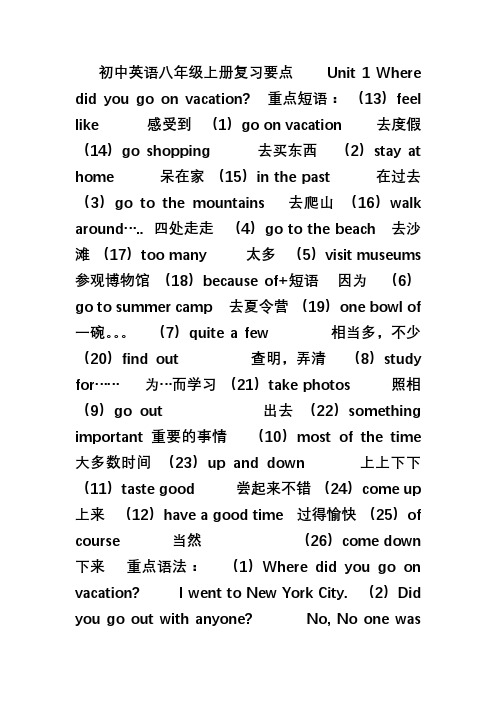
初中英语八年级上册复习要点 Unit 1 Where didyou go on vacation? 重点短语:(13)feel like 感受到(1)go on vacation 去度假(14)go shopping 去买东西(2)stay at home 呆在家(15)in the past 在过去(3)go to the mountains 去爬山(16)walk around….. 四处走走(4)go to the beach 去沙滩(17)too many 太多(5)visit museums 参观博物馆(18)because of+短语因为(6)go to summer camp 去夏令营(19)one bowl of 一碗。
(7)quite afew 相当多,不少(20)find out 查明,弄清(8)study for…… 为…而学习(21)take photos 照相(9)go out 出去(22)something important 重要的事情(10)most of the time 大多数时间(23)up and down 上上下下(11)taste good 尝起来不错(24)come up 上来(12)have a good time 过得愉快(25)of course 当然(26)come down 下来重点语法:(1)Where did you go on vacation?I went to New York City. (2)Did you go out with anyone? No, No one was here. Everyone was on vacation. (3)Did you buy anything special? Yes, Ibought something for my father. (4)How was the food? Everything tasted really good. (5)Did everyone have a good time? Oh,yes. Everything was excellent. 习惯用法:(9)try one`s best to do sth尽力做某事(1)buy sth for sb./ buy sb. sth 为某人(10)enjoy doing sth. 喜欢做某事买某物(11)want to do sth. 想去做某事(2)taste + adj. 尝起来…… (12)start doing sth. 开始做某事(3)nothing ….but + V.(原形) (13)stop doing sth. 停止做某事除了…之外什么都没有 stop to do sth 停下来做某事(4)seem + (to be) + adj 看起来(14)look + adj 看起来(5). arrive in + 大地方(15)dislike doing sth. 不喜欢做某事 arrive at + 小地方到达某地(16)Why not do sth. 为什么不做…….(6) decide to do sth. 决定做某事呢?(7). try doing sth. 尝试做某事(17)so + adj + that + 从句如此…以(8)try to do sth. 尽力做某事至于 1 (18)tell sb. (not) to do sth. 告诉某人(20).forget to do sth. 忘记去做某事(不要)做某事(未做)forget doing sth 忘记做过某(19) keep doing sth. 继续做某事事(已做)词语辨析:1anywhere 与somewhere 两者都是不定副词。
八年级英语上册语法归纳总结
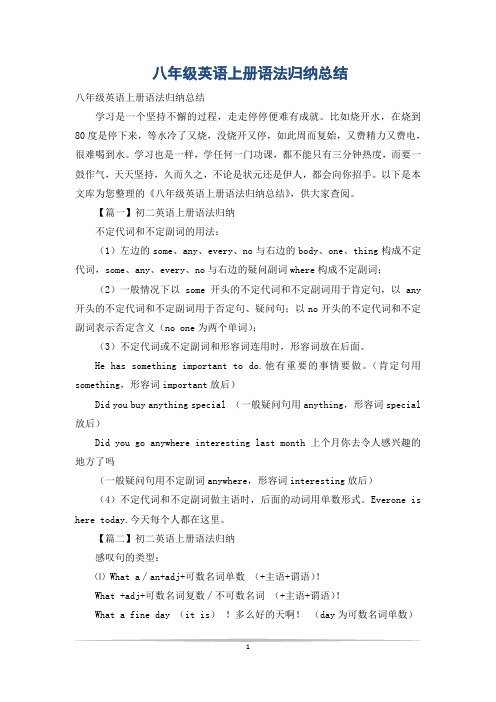
八年级英语上册语法归纳总结八年级英语上册语法归纳总结学习是一个坚持不懈的过程,走走停停便难有成就。
比如烧开水,在烧到80度是停下来,等水冷了又烧,没烧开又停,如此周而复始,又费精力又费电,很难喝到水。
学习也是一样,学任何一门功课,都不能只有三分钟热度,而要一鼓作气,天天坚持,久而久之,不论是状元还是伊人,都会向你招手。
以下是本文库为您整理的《八年级英语上册语法归纳总结》,供大家查阅。
【篇一】初二英语上册语法归纳不定代词和不定副词的用法:(1)左边的some、any、every、no与右边的body、one、thing构成不定代词,some、any、every、no与右边的疑问副词where构成不定副词;(2)一般情况下以some开头的不定代词和不定副词用于肯定句,以any 开头的不定代词和不定副词用于否定句、疑问句;以no开头的不定代词和不定副词表示否定含义(no one为两个单词);(3)不定代词或不定副词和形容词连用时,形容词放在后面。
He has something important to do.他有重要的事情要做。
(肯定句用something,形容词important放后)Did you buy anything special (一般疑问句用anything,形容词special 放后)Did you go anywhere interesting last month上个月你去令人感兴趣的地方了吗(一般疑问句用不定副词anywhere,形容词interesting放后)(4)不定代词和不定副词做主语时,后面的动词用单数形式。
Everone is here today.今天每个人都在这里。
【篇二】初二英语上册语法归纳感叹句的类型:⑴ What a∕an+adj+可数名词单数(+主语+谓语)!What +adj+可数名词复数∕不可数名词(+主语+谓语)!What a fine day (it is)!多么好的天啊!(day为可数名词单数)What an interesting book it is !多么有趣的一本书啊!(book为可数名词单数)What beautiful flowers they are !多么漂亮的花啊!(flowers为可数名词复数)What bad weather it is!多么糟糕的天气啊!(weather为不可数名词)⑵ How +adj +主语+(谓语中的)系动词! How +adv +主语+(谓语中的)实义动词!How happy I am!我多麽高兴啊!(happy为adj,am为系动词)How hard they are working !他们工作多么努力啊!(hard为adv,work 为实义动词)点拨:陈述句改为感叹句,可以采用"一判、二定、三移"。
2018版八年级上册语法点
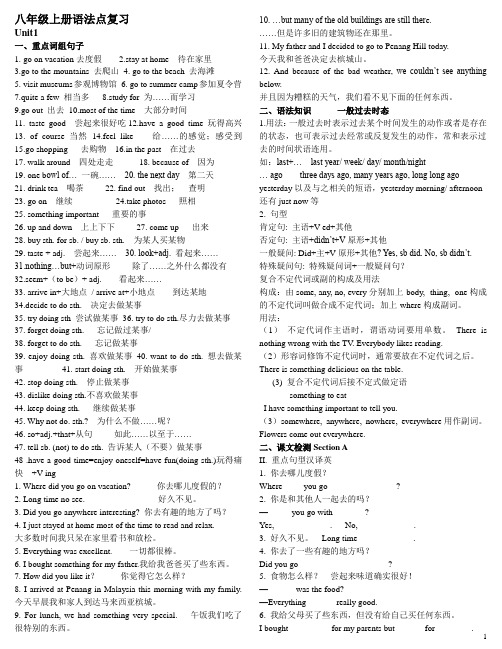
八年级上册语法点复习Unit1一、重点词组句子1. go on vacation去度假2.stay at home 待在家里3.go to the mountains 去爬山4. go to the beach 去海滩5. visit museums参观博物馆6. go to summer camp参加夏令营7.quite a few 相当多8.study for 为……而学习9.go out 出去10.most of the time 大部分时间11. taste good 尝起来很好吃12.have a good time 玩得高兴13. of course 当然14.feel like 给……的感觉;感受到15.go shopping 去购物16.in the past 在过去17. walk around 四处走走18. because of 因为19. one b owl of… 一碗…… 20. the next day 第二天21. drink tea 喝茶22. find out 找出;查明23. go on 继续24.take photos 照相25. something important 重要的事26. up and down 上上下下27. come up 出来28. buy sth. for sb. / buy sb. sth. 为某人买某物29. taste + adj. 尝起来…… 30. look+adj. 看起来……31.nothing…but+动词原形除了……之外什么都没有32.seem+(to be)+ adj. 看起来……33. arrive in+大地点/ arrive at+小地点到达某地34.decide to do sth. 决定去做某事35. try doing sth 尝试做某事36. try to do sth.尽力去做某事37. forget doing sth. 忘记做过某事/38. forget to do sth. 忘记做某事39. enjoy doing sth. 喜欢做某事40. want to do sth. 想去做某事41. start doing sth. 开始做某事42. stop doing sth. 停止做某事43. dislike doing sth.不喜欢做某事44. keep doing sth. 继续做某事45. Why not do. sth.? 为什么不做……呢?46. so+adj.+that+从句如此……以至于……47. tell sb. (not) to do sth. 告诉某人(不要)做某事48 .have a good time=enjoy oneself=have fun(doing sth.)玩得痛快+V-ing1. Where did you go on vacation? 你去哪儿度假的?2. Long time no see. 好久不见。
八年级上册英语语法归纳总结
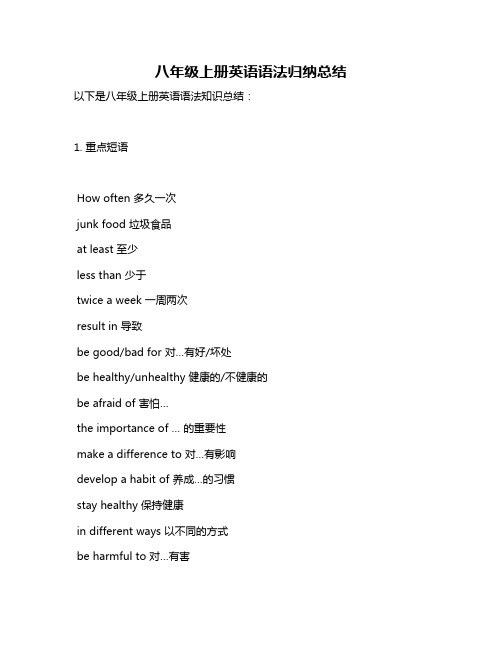
八年级上册英语语法归纳总结以下是八年级上册英语语法知识总结:1. 重点短语How often 多久一次junk food 垃圾食品at least 至少less than 少于twice a week 一周两次result in 导致be good/bad for 对…有好/坏处be healthy/unhealthy 健康的/不健康的be afraid of 害怕…the importance of … 的重要性make a difference to 对…有影响develop a habit of 养成…的习惯stay healthy 保持健康in different ways 以不同的方式be harmful to 对…有害the same as 和…一样be sure to 一定要…a balanced diet 均衡的饮食go to the doctor 看医生more than 多于less than 少于the number of … 的数量the importance of … 的重要性2. 重点句型It is+形容词+to do sth. 做某事是……的。
How often + 助动词 + 主语 + 动词 + 其他!对……频率提问。
What do you usually do…?你通常做什么……?I sometimes go to the library. 我有时去图书馆。
How many + 可数名词复数 + are there + 地点?有多少……在某地? How much + 不可数名词 + is there + 地点?有多少……在某地?Why do you want to do sth?你为什么想做某事?I want to do sth because it isfun/difficult/easy/interesting/boring/relaxing. 我想做某事,因为它是有趣的/困难的/容易的/有趣的/无聊的/放松的。
八年级上册英语知识点总结归纳

八年级上册英语知识点总结归纳八年级英语知识点总结(上)一、语法知识1. 一般现在时:肯定句:主语+动词原形否定句:主语+don’t/doesn’t+动词原形疑问句:Do/Does+主语+动词原形2.一般过去时:肯定句:主语+动词过去式否定句:主语+didn’t+动词原形疑问句:Did+主语+动词原形3.现在进行时:肯定句:主语+am/is/are+动词ing否定句:主语+am/is/are+not+动词ing疑问句:Am/Is/Are+主语+动词ing?4.过去进行时:肯定句:主语+was/were+动词ing否定句:主语+was/were+not+动词ing疑问句:Was/Were+主语+动词ing?5.一般将来时:肯定句:主语+will+动词原形否定句:主语+will+not+动词原形疑问句:Will+主语+动词原形?6.现在完成时:肯定句:主语+have/has+动词过去分词否定句:主语+have/has+not+动词过去分词疑问句:Have/Has+主语+动词过去分词?7.被动语态:肯定句:S+be+过去分词(如is made)否定句:S+be+not+过去分词(如is not made)疑问句:Be+S+过去分词(如Is he made?)8.情态动词:情态动词can表示能力、情态动词may表示可能性、情态动词must表示肯定、情态动词should表示建议二、词汇与用法1.主要时态动词:am, is, are, was, were, have, has, had, do, does, did, will2.数字、日期数字:英文数字0~9读法;10及以上的数字都是由个位数开始读;如20为twenty;30为thirty。
对于100及以上的数字,每三位为一组,组间用and连接。
日期:月份全称首字母大写并加上序数词,如January 1st。
3.动物、颜色、服装动物:动物的名称和外形等;颜色:基础颜色的单词;服装:常见的服装单词。
八年级上册英语知识点语法
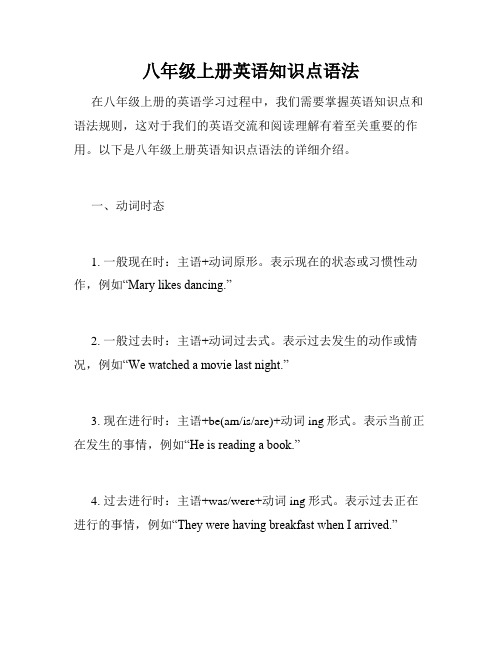
八年级上册英语知识点语法在八年级上册的英语学习过程中,我们需要掌握英语知识点和语法规则,这对于我们的英语交流和阅读理解有着至关重要的作用。
以下是八年级上册英语知识点语法的详细介绍。
一、动词时态1. 一般现在时:主语+动词原形。
表示现在的状态或习惯性动作,例如“Mary likes dancing.”2. 一般过去时:主语+动词过去式。
表示过去发生的动作或情况,例如“We watched a movie last night.”3. 现在进行时:主语+be(am/is/are)+动词ing形式。
表示当前正在发生的事情,例如“He is reading a book.”4. 过去进行时:主语+was/were+动词ing形式。
表示过去正在进行的事情,例如“They were having breakfast when I arrived.”5. 现在完成时:主语+have/has+动词过去分词。
表示过去发生但对现在仍有影响的动作,例如“I have eaten breakfast already.”6. 过去完成时:主语+had+动词过去分词。
表示过去某一时间之前已经完成的动作,例如“She had finished her homework before dinner.”二、情态动词情态动词可以表示能力、结果、可能性、许可和建议等不同的含义。
常用的情态动词有can, could, may, might, must, shall, should, will, would。
1. can表示能力,意思是“能够”,如“She can swim.”2. could表示过去的能力,意思是“曾经能够”,如“I could r un fast when I was young.”3. may表示可能性,意思是“可能”,如“It may rain later.”4. might表示更温和的可能性,如“They might come to the party.”5. must表示必要性,意思是“必须”,如“You must finish your homework before going out.”6. shall表示征求意见或建议,如“Shall we go to the beach this weekend?”7. should表示建议或规定,意思是“应该”,如“You should eat more vegetables.”8. will表示将来的意愿或可能性,意思是“将会”,如“I will move to a new house next month.”9. would表示愿望等更温和的表达,如“I would like to visit Paris someday.”三、形容词和副词1. 形容词用来描述人或物的特征,常放在名词前面,例如“a beautiful flower”和“an interesting book”。
八年级英语(人教版)上册重点语法知识点

八年级上册重点语法知识点1. 感叹句:感叹句是用来表达喜怒哀乐等强烈情感的句子。
感叹句一般用how或者what开头,句末加感叹号。
what修饰名词,how修饰形容词或副词。
具体句式如下:(1)what引导的感叹句:1)What a(an)+形容词+可数名词的单数形式+主语+谓语!What a clever boy he is!多么聪明的小男孩啊!2)What+形容词+可数名词的复数形式+主语+谓语!What interesting books the children are reading! 孩子们读的书多么有趣啊!3)What+形容词+不可数名词+主语+谓语!What cold weather it is!多冷的天!(2)how引导的感叹句:1)How+形容词或副词+主语+谓语!How lovely the baby is!这孩子真可爱!(lovely为形容词)How fast he runs! 他跑地多快啊!(fast为副词)2)How+形容词+a(an)+可数名词的单数形式+主语+谓语!How heavy a box they are carrying! 他们抬的箱子多重啊!3)How+主语+谓语!How time flies! 时间过得多快!( ) 1. interesting job this is!A.WhatB.HowC.What anD.How an( ) 2. Mo Yan won the Nobel Prize for Literature last year. _______excellent he is!A. HowB. WhatC. What aD. What an( ) 3. ---______day it is!--- Let’s go out and enjoy the sunshine!A. What a lovelyB. How windyC. What a rainyD. How lovely( ) 4. ______ terrible weather we had last Sunday!A. WhatB. What aC.HowD. How a( ) 5. ______useful the book is! We can know well about the city from it.A. WhatB. What aC. HowD. What an( ) 6. _____great picture! Who painted it?A. HowB. WhatC. How aD. What a( ) 7. ______ a beautiful car! I’ve never seen it before.A. WhatB. WhichC.HowD.Whether2. How oftenhow often意为“多久一次”,常用于对时间频率的提问。
八年级上册英语重点语法归纳

八年级上册英语重点语法归纳一、一般过去时。
1. 概念:表示过去某个时间发生的动作或存在的状态。
2. 标志词:yesterday(昨天), last week(上周), last month(上个月), last year(去年), two days ago(两天前), in 1990(在 1990 年)等。
3. 构成:- 主语 + was / were + 其他(主语是第一人称 I 和第三人称单数用 was,其他人称用 were)- 主语 + 动词的过去式 + 其他。
4. 动词过去式的构成规则:- 一般在动词末尾加 -ed,如:play - played。
- 结尾是 e 的动词加 -d,如:like - liked。
- 重读闭音节词,双写末尾辅音字母再加 -ed,如:stop - stopped。
- 以辅音字母 + y 结尾的动词,变 y 为 i 再加 -ed,如:study - studied。
二、频度副词。
1. 常见的频度副词有:always(总是), usually(通常), often(经常), sometimes(有时), seldom(很少), never(从不)2. 频度副词在句中的位置:通常放在实义动词之前,be 动词、助动词或情态动词之后。
三、形容词和副词的比较级和最高级。
1. 比较级的构成规则:- 一般在词尾加 -er。
- 以不发音的 e 结尾的词加 -r。
- 重读闭音节词,双写末尾辅音字母再加 -er。
- 以“辅音字母 + y”结尾的词,变 y 为 i 再加 -er。
- 多音节词和部分双音节词在前面加 more。
2. 最高级的构成规则:- 一般在词尾加 -est。
- 以不发音的 e 结尾的词加 -st。
- 重读闭音节词,双写末尾辅音字母再加 -est。
- 以“辅音字母 + y”结尾的词,变 y 为 i 再加 -est。
- 多音节词和部分双音节词在前面加 most。
3. 比较级和最高级的用法:- 比较级用于两者之间的比较,常用 than 连接。
八年级上册英语语法知识点归纳总结
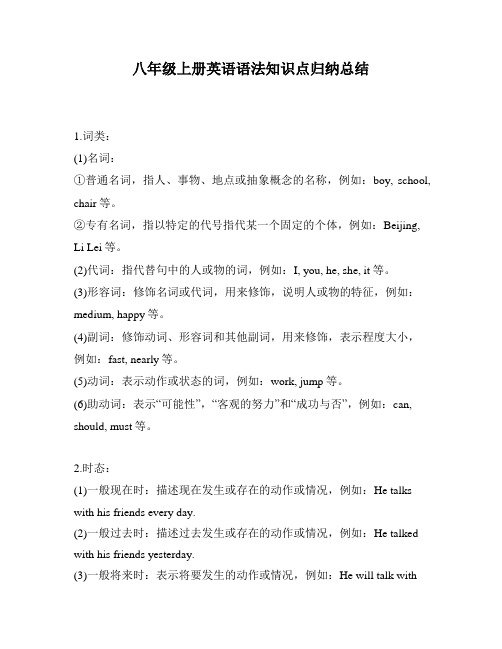
八年级上册英语语法知识点归纳总结1.词类:(1)名词:①普通名词,指人、事物、地点或抽象概念的名称,例如:boy, school, chair等。
②专有名词,指以特定的代号指代某一个固定的个体,例如:Beijing, Li Lei等。
(2)代词:指代替句中的人或物的词,例如:I, you, he, she, it等。
(3)形容词:修饰名词或代词,用来修饰,说明人或物的特征,例如:medium, happy等。
(4)副词:修饰动词、形容词和其他副词,用来修饰,表示程度大小,例如:fast, nearly等。
(5)动词:表示动作或状态的词,例如:work, jump等。
(6)助动词:表示“可能性”,“客观的努力”和“成功与否”,例如:can, should, must等。
2.时态:(1)一般现在时:描述现在发生或存在的动作或情况,例如:He talks with his friends every day.(2)一般过去时:描述过去发生或存在的动作或情况,例如:He talked with his friends yesterday.(3)一般将来时:表示将要发生的动作或情况,例如:He will talk withhis friends tomorrow.(4)现在进行时:表示正在进行的动作或情况,例如:He is talking with his friends now.(5)过去进行时:表示过去发生的持续性的动作,例如:He was talking with his friends at that time.3.句子:(1)陈述句:表述的是一个简单的事实,是客观真理,例如:He is twelve years old.(2)疑问句:表述的是一个疑问,旨在寻求答案,例如:How old is he?(3)祈使句:表述着一种请求、命令或建议,例如:Listen to me carefully.(4)感叹句:表达着一种感叹、惊讶、声明或概括的句子,例如:Whata wonderful day it is!4.句型:(1)一般疑问句:用于寻求答案的疑问句,例如:Do you have a pen?(2)特殊疑问句:用于寻求特定的信息的疑问句,例如:What colour is your schoolbag?(3)祈使句:用于表达请求、命令或建议,例如:Let's help the old man.(4)感叹句:用于表达感叹、惊叹、声明或概括,例如:Oh, how beautiful this scene is!(5)There be 句型:表示某特定人物或地点出现的情况,例如:There are three apples on the table.(6)主谓宾句:表述着动作或存在的一种句子结构,例如:He is playingbasketball.(7)宾语从句:放在句子中,用来解释主句谓语动词的一种句型,例如:He said that he would go to the park.。
人教版2018-2019学年八年级英语第一学期全册单元知识点归纳
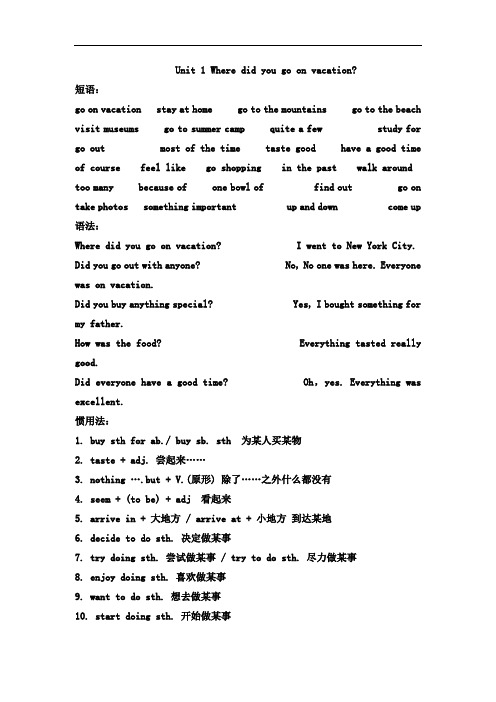
Unit 1 Where did you go on vacation?短语:go on vacation stay at home go to the mountains go to the beachvisit museums go to summer camp quite a few study forgo out most of the time taste good have a good timeof course feel like go shopping in the past walk aroundtoo many because of one bowl of find out go ontake photos something important up and down come up 语法:Where did you go on vacation? I went to New York City.Did you go out with anyone? No, No one was here. Everyonewas on vacation.Did you buy anything special? Yes, I bought something formy father.How was the food? Everything tasted really good.Did everyone have a good time? Oh,yes. Everything was excellent.惯用法:1. buy sth for ab./ buy sb. sth 为某人买某物2. taste + adj. 尝起来……3. nothing ….but + V.(原形) 除了……之外什么都没有4. seem + (to be) + adj 看起来5. arrive in + 大地方 / arrive at + 小地方到达某地6. decide to do sth. 决定做某事7. try doing sth. 尝试做某事 / try to do sth. 尽力做某事8. enjoy doing sth. 喜欢做某事9. want to do sth. 想去做某事10. start doing sth. 开始做某事11. stop doing sth. 停止做某事12. look + adj 看起来13. dislike doing sth. 不喜欢做某事14. Why not do sth. 为什么不做…….呢?15. so + adj + that + 从句如此……以至于……16. tell sb. (not) to do sth. 告诉某人(不要)做某事17. keep doing sth. 继续做某事18. forget to do sth. 忘记去做某事 / forget doing sth 忘记做过某事词语辨析:1.anywhere 与 somewhere 两者都是不定副词。
八年级上册英语语法重点

八年级上册英语语法重点八年级上册英语语法的重点主要包括以下几个方面:1. 宾语从句:宾语从句是八年级上册英语语法的重点之一。
在宾语从句中,需要注意连接词的选择(如that、if/whether、wh-等),时态的呼应(主句是现在时,从句时态不受限制;主句是过去时,从句一般也用过去时态),以及语序的调整(从句部分需要用陈述句语序)。
2. 情态动词:情态动词的用法和含义也是八年级上册英语语法的重点。
情态动词包括can、could、may、might、must、shall、should等,表示推测、可能性、义务、命令等含义。
需要掌握情态动词的基本用法和搭配。
3. 现在完成时:现在完成时是八年级上册英语语法中比较难掌握的一个时态。
需要掌握现在完成时的基本用法(表示过去发生的动作对现在造成的影响或结果,或者表示从过去某一时间开始并一直持续到现在的动作或状态),以及常用的时间状语(如just now、already、yet等)。
4. 形容词和副词的比较级和最高级:形容词和副词的比较级和最高级是八年级上册英语语法中的一个重要知识点。
需要掌握形容词和副词的比较级和最高级的变化规则以及常用的比较级和最高级形式。
5. 动词不定式:动词不定式是八年级上册英语语法中的一个难点。
需要掌握动词不定式的基本形式(to+动词原形)、用法(作为主语、宾语、定语等)以及常见的固定搭配(如too…to…结构等)。
6. 过去进行时:过去进行时是八年级上册英语语法中的一个重要时态。
需要掌握过去进行时的基本用法(表示过去某一时刻正在进行的动作或状态)以及常用的时间状语(如at that time、last night 等)。
7. 定语从句:定语从句也是八年级上册英语语法的一个重点。
在定语从句中,需要注意关系代词的选择(如who、that、which 等)以及定语从句的语序调整。
8. 虚拟语气:虚拟语气是八年级上册英语语法中的一个难点。
需要掌握虚拟语气的基本用法(表示假设或虚拟的情况)以及常见的虚拟语气形式(如if引导的非真实条件句等)。
2018-2019学年外研版八年级英语上册全册知识点归纳总结

Module1 How to learn EnglishUnit1 Let’s try to speak English as much as possible.1.Welcome back!Welcome back to school!Welcome to China/our school/my home town! Welcome home!You’re welcome.give sb. a cold/warm welcome注意welcome的词性 v. adj n.2.talk with/to sb. about sth.have a talk/conversation with sb.3. ask for some advicea piece of advice注意advice是不可数名词,不能说these advice give sb. advice给某人建议take/follow one’s advice听从某人的建议4. speak English in classspeak English as much as possibleread books as many as you canas…as possible = as…as one can/could5. write down our mistakes in our notebookswrite it/them down (代词宾格只能放中间)类似结构还有pick up, take off, put on, turn on, turn off, turn down, turn up6. forget/ remember to do sth.记得、忘记要做某事(还没做)forget/remember doing sth. 记得、忘记做过某事(已经做了)eg: Don’t forget to bring your photos herewhen you come.I remember seeing him somewhere in Jiaxing. 我记得在嘉兴的某个地方见过他。
八年级上册英语语法归纳总结(通用11篇)

八年级上册英语语法归纳总结第1篇单音节形容词和部分双音节词大多是以y、ly、er结尾的双音节形容词,一般在词尾加-er。
以不发音字母e结尾的词,在词尾直接加-r。
重读闭音节词词尾只有一个辅音字母,元音发短音时,双写尾字母,再加er。
以“辅音字母+y”结尾的双音节词,变“y”为“i”,再加-er。
多音节词三音节及以上和部分双音节词,在词前加“more”。
部分形容词和副词的比较级是不规则的,如:good/well-better,bad/badly-worse。
由“动词+后缀-ing/-ed”构成的形容词,在词前加more构成比较级。
如:interesting-more interesting,bored-more bored。
由“形容词+后缀-ly”构成的副词,在该副词前加more构成比较级。
如:slowly-more slowly,happily- more happily。
八年级上册英语语法归纳总结第2篇He said I was hard-working.重点语法:宾语从句结构:主语 + 谓语动词 + 宾语从句(主语 + 谓语动词 + 宾语/表语)例句:----Im good at English. He says. (改为加宾语从句的复合句)----He says Im good at English.注意:①主句是一般现在时态,宾语从句的时态不受其影响。
例句:He says Im good at English now.He says I was good at mathematics when I was young.②主句是过去时态,宾语从句也要用过去时态。
例句:He said I was good at mathematics when I was young yesterday.He said I was good at English now yesterday.③宾语从句是客观真理时永远用一般现在时态。
八上英语语法知识点归纳
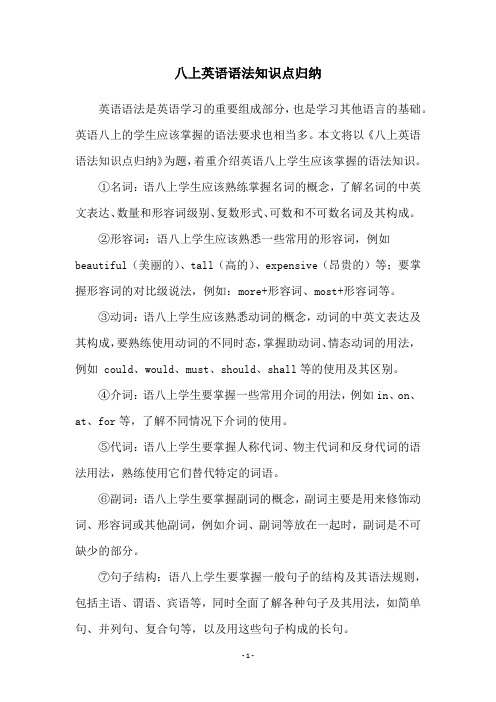
八上英语语法知识点归纳英语语法是英语学习的重要组成部分,也是学习其他语言的基础。
英语八上的学生应该掌握的语法要求也相当多。
本文将以《八上英语语法知识点归纳》为题,着重介绍英语八上学生应该掌握的语法知识。
①名词:语八上学生应该熟练掌握名词的概念,了解名词的中英文表达、数量和形容词级别、复数形式、可数和不可数名词及其构成。
②形容词:语八上学生应该熟悉一些常用的形容词,例如beautiful(美丽的)、tall(高的)、expensive(昂贵的)等;要掌握形容词的对比级说法,例如:more+形容词、most+形容词等。
③动词:语八上学生应该熟悉动词的概念,动词的中英文表达及其构成,要熟练使用动词的不同时态,掌握助动词、情态动词的用法,例如 could、would、must、should、shall等的使用及其区别。
④介词:语八上学生要掌握一些常用介词的用法,例如in、on、at、for等,了解不同情况下介词的使用。
⑤代词:语八上学生要掌握人称代词、物主代词和反身代词的语法用法,熟练使用它们替代特定的词语。
⑥副词:语八上学生要掌握副词的概念,副词主要是用来修饰动词、形容词或其他副词,例如介词、副词等放在一起时,副词是不可缺少的部分。
⑦句子结构:语八上学生要掌握一般句子的结构及其语法规则,包括主语、谓语、宾语等,同时全面了解各种句子及其用法,如简单句、并列句、复合句等,以及用这些句子构成的长句。
其他还有一些语法重点,比如插入语、间接引语、连接词、定语从句、名词性从句等,但这些知识点在英语八上的语法书中可以找到,故不在本文中详述。
本文以《八上英语语法知识点归纳》为题,简要介绍了英语八上学生应掌握的语法知识,以上知识点是每个学生在学英语时应牢记的重点,并在平常的学习、练习中加以巩固。
只有掌握和运用这些知识点,才能帮助英语八上学生在英语学习上取得更大的进步。
八年级英语上册语法知识点总结
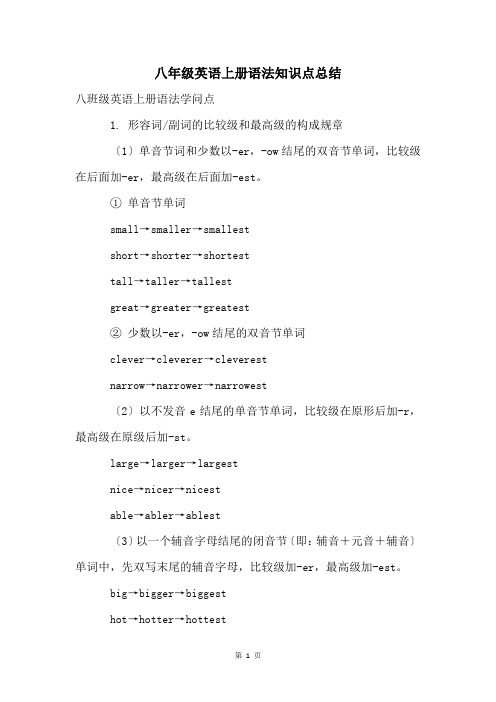
八年级英语上册语法知识点总结八班级英语上册语法学问点1. 形容词/副词的比较级和最高级的构成规章〔1〕单音节词和少数以-er,-ow结尾的双音节单词,比较级在后面加-er,最高级在后面加-est。
① 单音节单词small→smaller→smallestshort→shorter→shortesttall→taller→tallestgreat→greater→greatest② 少数以-er,-ow结尾的双音节单词clever→cleverer→cleverestnarrow→narrower→narrowest〔2〕以不发音e结尾的单音节单词,比较级在原形后加-r,最高级在原级后加-st。
large→larger→largestnice→nicer→nicestable→abler→ablest〔3〕以一个辅音字母结尾的闭音节〔即:辅音+元音+辅音〕单词中,先双写末尾的辅音字母,比较级加-er,最高级加-est。
big→bigger→biggesthot→hotter→hottestfat→fatter→fattest〔4〕以“辅音字母+y”结尾的双音节词,把y改为i,比较级加-er,最高级加-est。
easy→easier→easiestheavy→heavier→heaviestbusy→busier→busiesthappy→happier→happiest〔5〕其他双音节词和多音节词,比较级在前面加more,最高级在前面加most。
beautiful→more beautiful→most beautifuldifferent→more different→most differenteasily→more easily→most easily〔6〕有少数形容词、副词的比较级和最高级是不规章的,必需熟记。
good→better→bestwell→better→bestbad→worse→worstill→worse→worstold→older/elder→oldest/eldestmany/much→more→mostlittle→less→leastfar →further/farther→ furthes t/farthest2. 形容词和副词比较级的用法〔1〕“甲+be+(倍数)+形容词比较级+than+乙”表示“甲比乙…”或“甲比乙…几倍”。
初二英语上学期所有必考语法点汇总
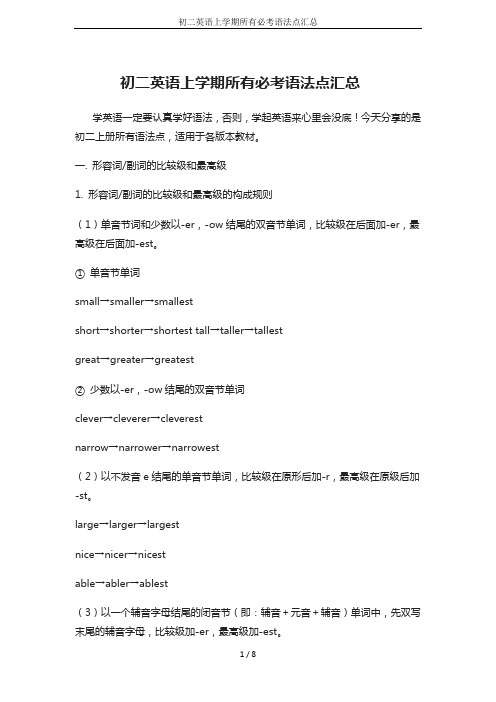
初二英语上学期所有必考语法点汇总学英语一定要认真学好语法,否则,学起英语来心里会没底!今天分享的是初二上册所有语法点,适用于各版本教材。
一. 形容词/副词的比较级和最高级1. 形容词/副词的比较级和最高级的构成规则(1)单音节词和少数以-er,-ow结尾的双音节单词,比较级在后面加-er,最高级在后面加-est。
①单音节单词small→smaller→smallestshort→shorter→shortest tall→taller→tallestgreat→greater→greatest②少数以-er,-ow结尾的双音节单词clever→cleverer→cleverestnarrow→narrower→narrowest(2)以不发音e结尾的单音节单词,比较级在原形后加-r,最高级在原级后加-st。
large→larger→largestnice→nicer→nicestable→abler→ablest(3)以一个辅音字母结尾的闭音节(即:辅音+元音+辅音)单词中,先双写末尾的辅音字母,比较级加-er,最高级加-est。
big→bigger→biggesthot→hotter→hottestfat→fatter→fattest(4)以“辅音字母+y”结尾的双音节词,把y改为i,比较级加-er,最高级加-est。
easy→easier→easiestheavy→heavier→heaviest busy→busier→busiesthappy→happier→happiest(5)其他双音节词和多音节词,比较级在前面加more,最高级在前面加most。
beautiful→more beautiful→most beautifuldifferent→more different→most different easily→more easily→most easily(6)有少数形容词、副词的比较级和最高级是不规则的,必须熟记。
- 1、下载文档前请自行甄别文档内容的完整性,平台不提供额外的编辑、内容补充、找答案等附加服务。
- 2、"仅部分预览"的文档,不可在线预览部分如存在完整性等问题,可反馈申请退款(可完整预览的文档不适用该条件!)。
- 3、如文档侵犯您的权益,请联系客服反馈,我们会尽快为您处理(人工客服工作时间:9:00-18:30)。
1⑴ 以ow 或er 结尾的双音节词,加_________。
如: clever __________; narrow __________ ⑵ 如果是在加 的双音节词的词前加上前缀un-的词,该词随着加________,不加_______。
如:happy ___________ unhappy_______ lucky ____________ unlucky __________. 4.比较级的用法: ⑴ than 句式:① than 连接的比较对象要一致。
如:我的头发比她的头发长。
My hair is ______ than _______.我们的学校要比露西的学校大。
Our school is ________ than _______.② 当than 连接的另一个比较的是同类物时,一般用或 指代。
如:北京的天气比上海热。
The weather in Beijing is __________ than ______ in Shanghai.四班的课桌椅比三班的课桌椅干净。
The desks and chairs in Class 4 are ______ than _______ in Class 3. ③ 表示“大几岁、高多少、多少倍”时,常用“数量词+形容词 +than….”。
如:她比我大三岁。
She’s ________________ than I (me). 这条河比那条河长5公里。
This river is __________ than that one.这个房间比那个房间大3倍。
This room is __________ than that one.④ 表示“不如”时,可用“ + +than”。
如:这支笔没有那支笔贵。
This pen is _______________ than that one.⑤ 表示“比其他的任何……都……”,使用句型“比较级+than + ________ + _______名词”或“比较级+than + ________ + _______名词”。
但是,如不在同一范围内的比较,than 后则用___________ + ___________名词。
如:中国比亚洲其他任何国家都大。
China is _____ than ________ in Asia.=China is ___________ than _____________ in Asia.上海比澳大利亚的任何城市都大。
Shanghai is ___________ than ___________ in Australia. ⑵疑问句:Which/ Who is + ____________, A or B? 如:哪个科目更容易,英语还是数学?Which ______ is _______, English or maths?⑶表示“两个中比较……”,使用句型“the + _________ or the two”。
如:David是这对双胞胎中比较聪明的一个。
David is ___________ of ____________.⑷表示“越来越……”,使用“___________ and _________”或者“__________+__________+原级”。
如:他学习越来越努力了。
He studies _________ and _______./ He is ________ and _______ ___________.⑸表示“越……就越……”,使用句式“The + _________ +句子,the + ________ +句子”。
如:我们拥有越多,我们想要的就越多。
The _______________, the ________.㈡实战演练一.根据中文写出下列形容词或副词的原级和比较级。
1.高的______ _______ 2. 有趣的______ _______ 3.病的______ _______ 4. 迟的______ _______ 5.(天气)好的______ ______ 6. 早的______ _______ 7.快的______ _______8.忙碌的______ _______ 9.安静地______ _______10.安静的_____ _____ 11.少的(后接不可数)____ ____12.少的(后接复数)___ ____ 13.清晰的______ _______ 14.清晰地______ _______ 15.容易的______ _______16.容易地______ _______ 17.胖的______ _______18.瘦/薄的______ _______ 19.严肃地______ _______20.兴奋的______ _______ 21.疲倦的______ _______22. 可爱的______ _______ 23.受欢迎的______ _______24.重的______ _______ 25.友好的______ _______26.远的______ _______ 27.旧的______ _______28.坏的______ _______ 29.(辈分)大的______ _______30.大的______ _______ 31.巨大的______ _______32.深入的______ _______ 33.不幸的______ _______34.幸运地______ _______ 35.脏的______ _______36.懒的______ _______ 37.干燥的______ _______38.困难的______ _______ 39.聪明的______ _______40.重要的______ _______ 二.根据句意或括号中的单词提示填空。
1.She will be much _______(happy) in her new class.2.Which is _____(easy) to learn, fishing or swimming?3.Shanghai is larger than any ______(city) in Sichuan.4.In Changchun, the Jing Yue Forest Park is much_____ (clean) than that in the center of the city.5.It makes ______(little) time to go to Beijing by planethan by train.6.Mum, this T-shirt is much too small for me. Wouldyou buy me a _______( large) one?7.Xi’an is one of _____(old) capital lives in China.8._______(few) children there are in a family,_____(good) their life will be.9.It will be bad for your health to eat ______(much)food and take ______(little) exercise. 10.Now China has joined the WTO, so I think English is_______(useful) than before.11.The short one is _________(useful) of the two.12.This ruler is twice as ________(long) as the old one.13.Book II is _________( different) than Book IV.14.The new dress is not so _____(long) as the old one.= The new dress is ________(long) than the old one.15.She is becoming __________( beautiful) than before.16.The weather in Fujian is better than ______(this) inWuhan.17.The texts in Book II are much easier than_____(these) in Book IV.18.The weather is getting ________ and _______ (cold).19.The _______(much), the _______(good)20.The _______( much) you practice, the _______(easy)it becomes.三.选择填空。
( )1. In fact, listening is just as ________ as speaking in language learning.A.importantB. more importantC. more difficultD. more interesting ( )2. The boy is ____ than me, but he eats ___ than me.A.younger; moreB. young; muchC. young; manyD. more; young; more ( )3. —“Food Safety”problem is becoming _____ these days. —I think so. The government must do something to deal with it.A.smaller and smallerB. worse and worseC. better and betterD. nicer and nice( )4. Li Tao, my best friend, is _______ more outgoing than any other student in his class.A.veryB. a littleC. tooD. quite( )5. You look _______ in this dress.A.young and beautifulerB. younger and beautifulC. younger and more beautifulD. young and more beautiful ( )6. —This box is ______ heavy for me to carry. Can you help me move it to my car? —Certainly.A.much tooB. too muchC. so muchD. very much ( )7. Are you better today? No, even ____. I must see the doctor right away.A.betterB. worseC. goodD. bad( )8. I am older than my brother. But he is _____ me. A.more taller than B. much tall thanC. as taller asD. a little taller than( )9. —Who would you like to be your partner, Tom or Sam? —They are both smart. But I think Sam would be the _____ one. He is funnier.A.goodB. betterC. firstD. last2( )10.Traveling by ship is _______ than taking a bus. A. a lot of fun B. much funC. a little more funD. a lot of more fun( )11. These days Ms Zheng looks ______ tired.A.muchB. prettyC. farD. a bit( )12. Danny is just _____ than Jason.A.more tallerB. a little tallC. more tallD. a little taller( )13. —How old is his sister? —She is two years ____ than him.A.youngB. youngerC. oldD. elder( )14. The girl is badly ill. She looks _____ than yesterday.A.more badB. more badlyC. a lot worseD. very worse( )15. Kate is _______ of the two children, so she needs taking great care of her sister.A.olderB. the olderC. youngD. younger ( )16. The size of this classroom is much ______ than that one.A.strongerB. biggerC. moreD. longer ( )17. The question is _____ difficult, but that one is _____ more difficult than it.A.much; prettyB. quite; soC. so; a lotD. a little; a little( )18. Light travels ______ than sound.A.much fastB. far fastC. much fasterD. more faster ( )19. Bill is taller than ______ student in his class.A.anyB. any otherC. anyoneD. one( )20. Bill and I are in different classes. He is taller than _____ student in our class.A.anyB. any otherC. anyoneD. one四.翻译句子。
